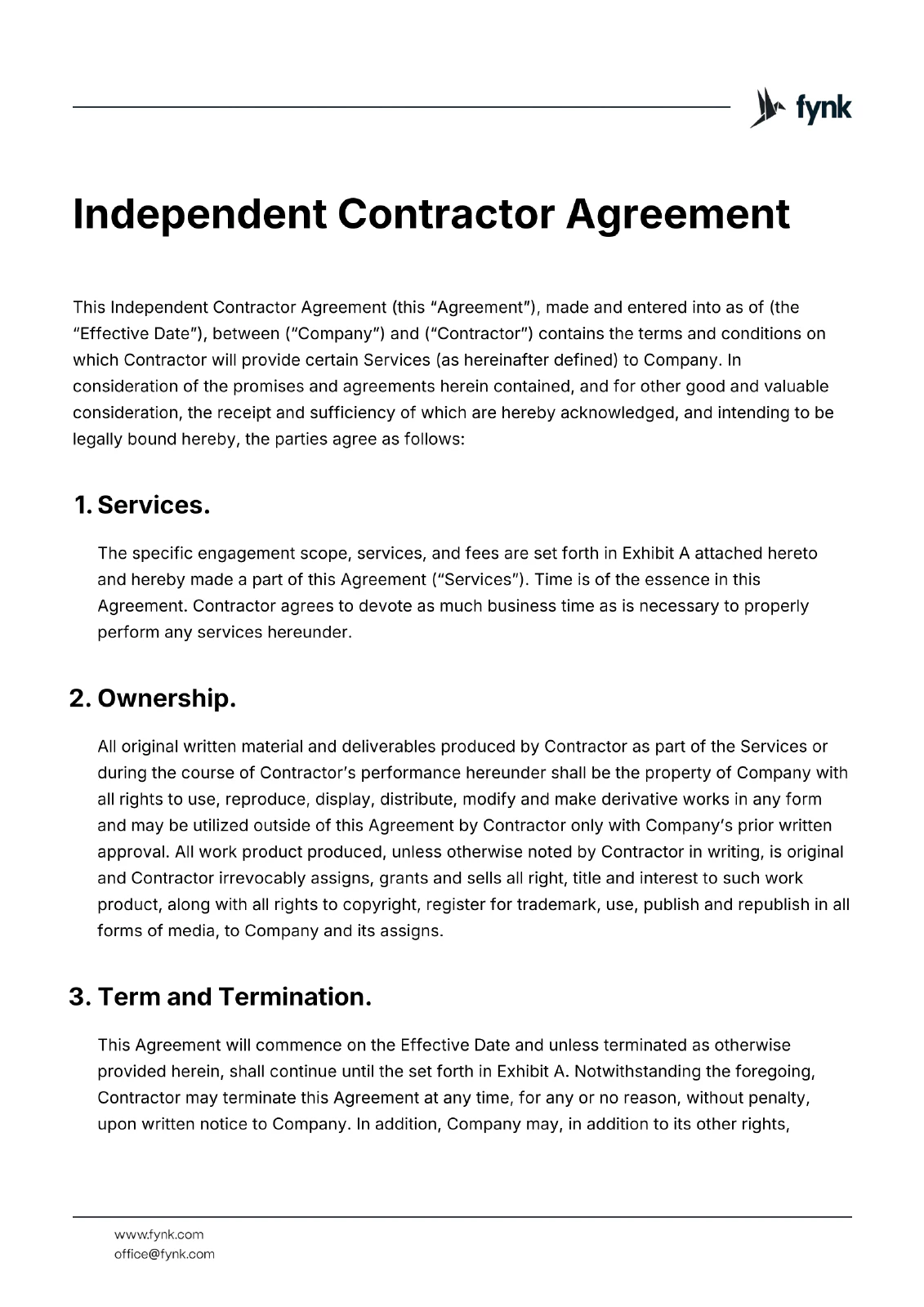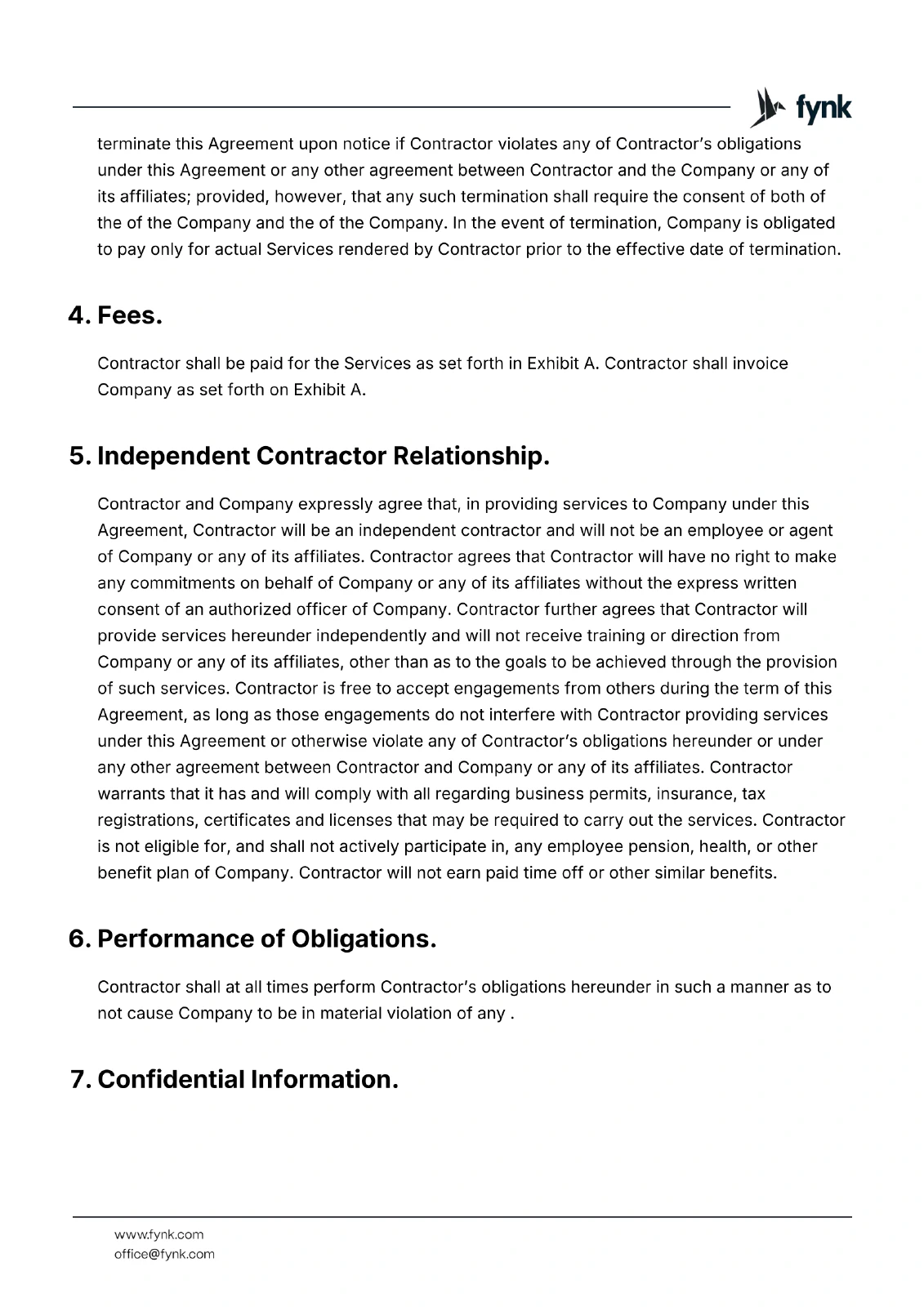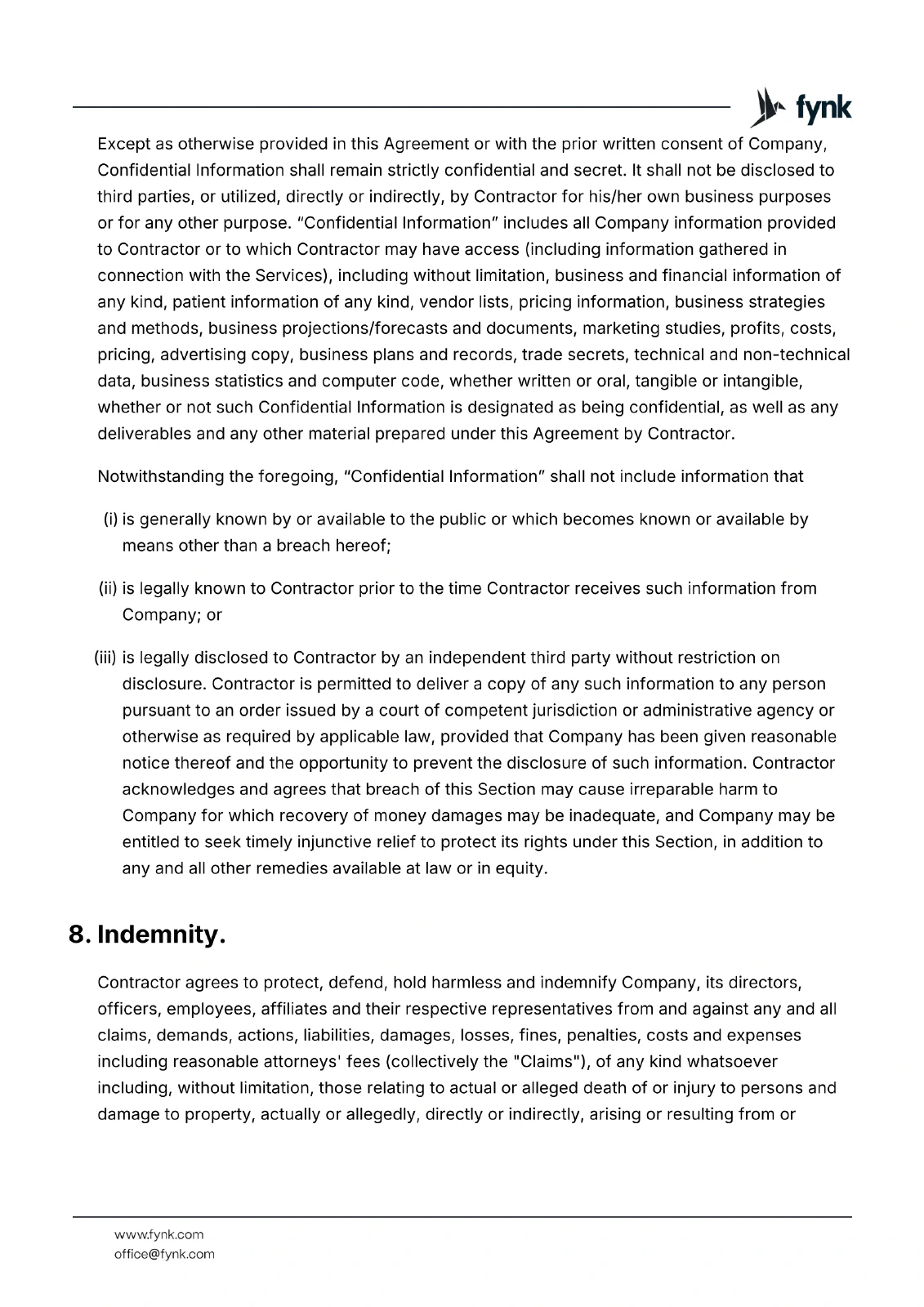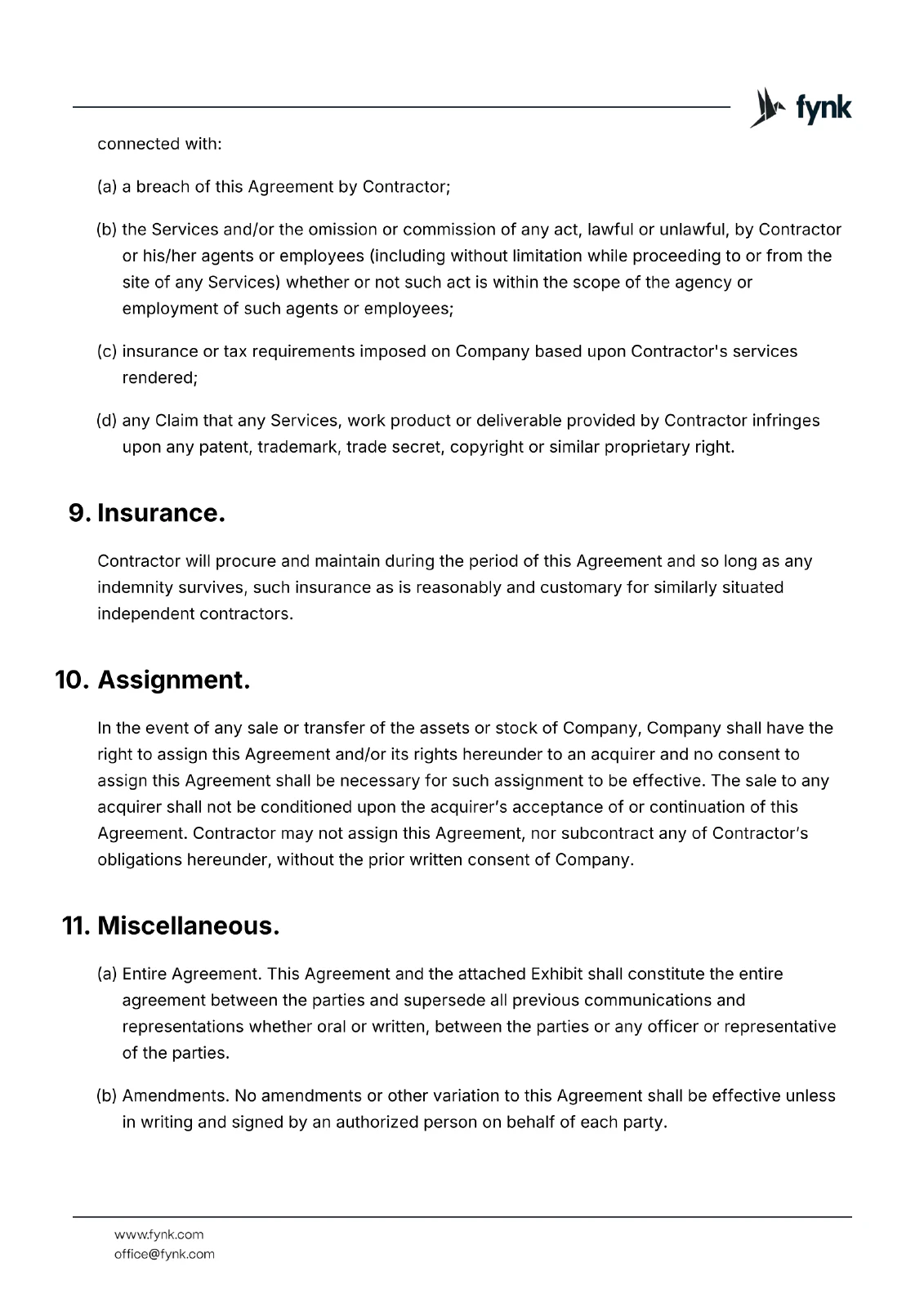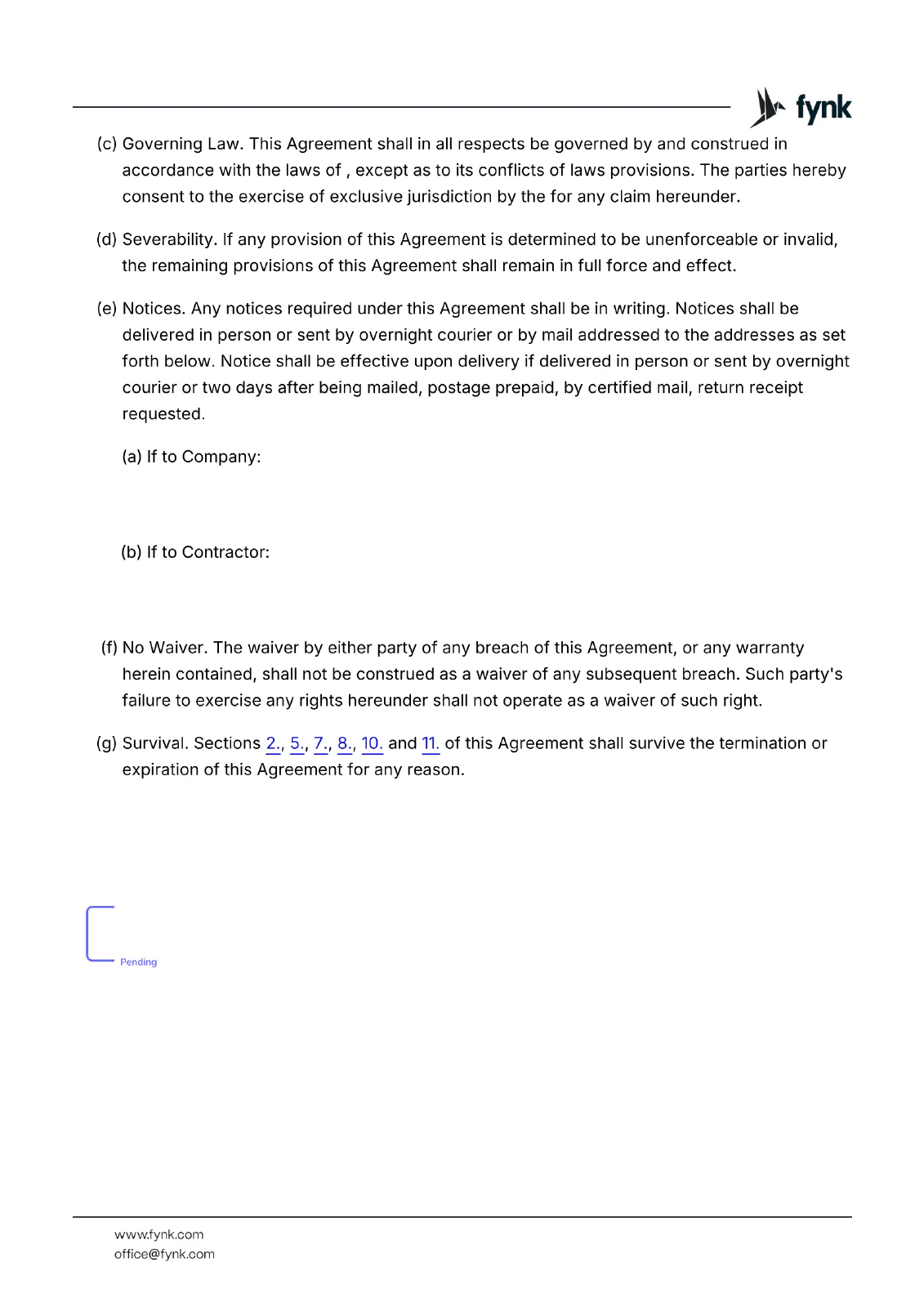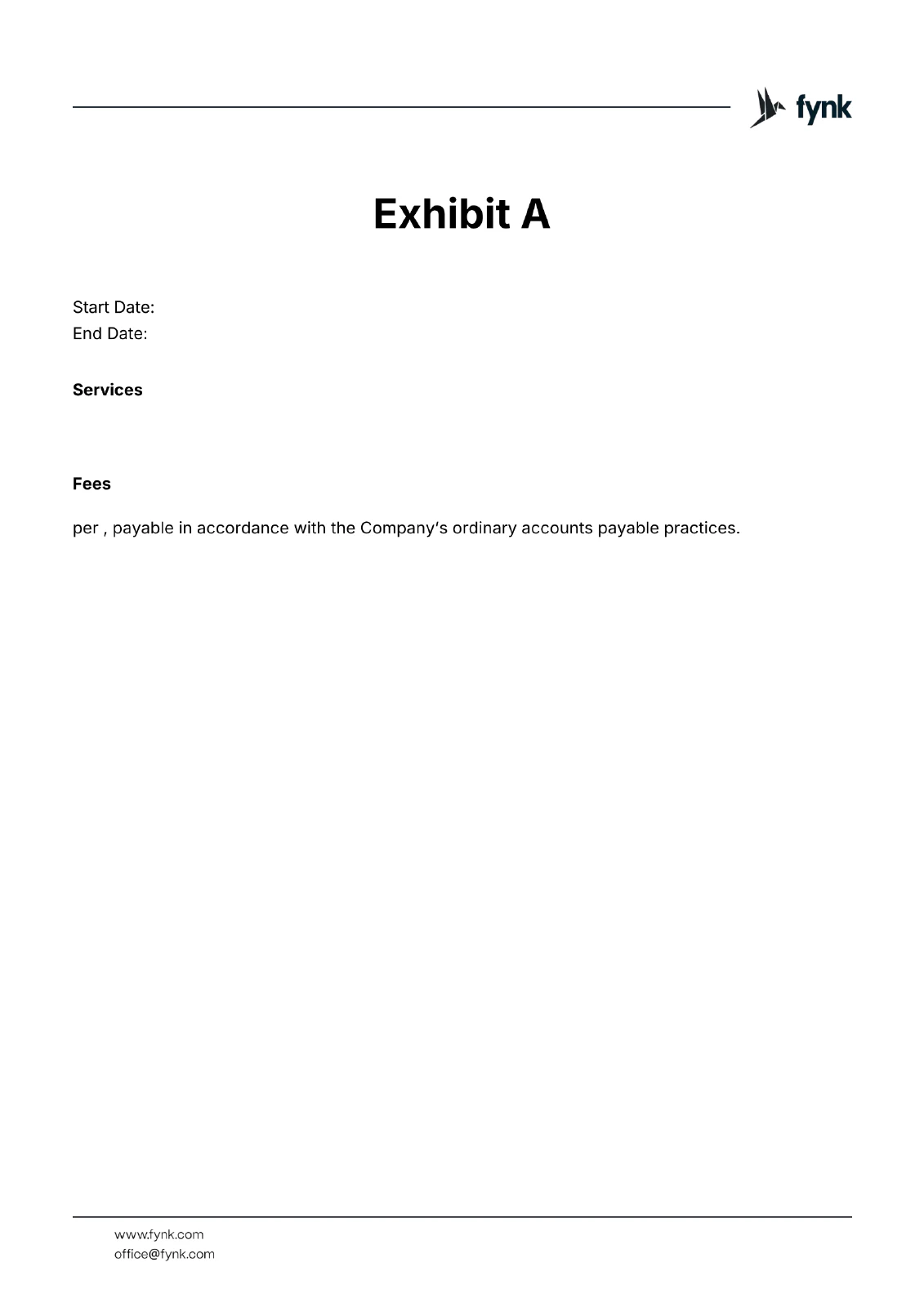Independent Contractor Agreement
This Independent Contractor Agreement (this “Agreement”), made and entered into as of (the “Effective Date”), between (“Company”) and (“Contractor”) contains the terms and conditions on which Contractor will provide certain Services (as hereinafter defined) to Company. In consideration of the promises and agreements herein contained, and for other good and valuable consideration, the receipt and sufficiency of which are hereby acknowledged, and intending to be legally bound hereby, the parties agree as follows:
Services.
The specific engagement scope, services, and fees are set forth in Exhibit A attached hereto and hereby made a part of this Agreement (“Services”). Time is of the essence in this Agreement. Contractor agrees to devote as much business time as is necessary to properly perform any services hereunder.
Ownership.
All original written material and deliverables produced by Contractor as part of the Services or during the course of Contractor’s performance hereunder shall be the property of Company with all rights to use, reproduce, display, distribute, modify and make derivative works in any form and may be utilized outside of this Agreement by Contractor only with Company’s prior written approval. All work product produced, unless otherwise noted by Contractor in writing, is original and Contractor irrevocably assigns, grants and sells all right, title and interest to such work product, along with all rights to copyright, register for trademark, use, publish and republish in all forms of media, to Company and its assigns.
Term and Termination.
This Agreement will commence on the Effective Date and unless terminated as otherwise provided herein, shall continue until the set forth in Exhibit A. Notwithstanding the foregoing, Contractor may terminate this Agreement at any time, for any or no reason, without penalty, upon written notice to Company. In addition, Company may, in addition to its other rights, terminate this Agreement upon notice if Contractor violates any of Contractor’s obligations under this Agreement or any other agreement between Contractor and the Company or any of its affiliates; provided, however, that any such termination shall require the consent of both of the of the Company and the of the Company. In the event of termination, Company is obligated to pay only for actual Services rendered by Contractor prior to the effective date of termination.
Fees.
Contractor shall be paid for the Services as set forth in Exhibit A. Contractor shall invoice Company as set forth on Exhibit A.
Independent Contractor Relationship.
Contractor and Company expressly agree that, in providing services to Company under this Agreement, Contractor will be an independent contractor and will not be an employee or agent of Company or any of its affiliates. Contractor agrees that Contractor will have no right to make any commitments on behalf of Company or any of its affiliates without the express written consent of an authorized officer of Company. Contractor further agrees that Contractor will provide services hereunder independently and will not receive training or direction from Company or any of its affiliates, other than as to the goals to be achieved through the provision of such services. Contractor is free to accept engagements from others during the term of this Agreement, as long as those engagements do not interfere with Contractor providing services under this Agreement or otherwise violate any of Contractor’s obligations hereunder or under any other agreement between Contractor and Company or any of its affiliates. Contractor warrants that it has and will comply with all regarding business permits, insurance, tax registrations, certificates and licenses that may be required to carry out the services. Contractor is not eligible for, and shall not actively participate in, any employee pension, health, or other benefit plan of Company. Contractor will not earn paid time off or other similar benefits.
Performance of Obligations.
Contractor shall at all times perform Contractor’s obligations hereunder in such a manner as to not cause Company to be in material violation of any .
Confidential Information.
Except as otherwise provided in this Agreement or with the prior written consent of Company, Confidential Information shall remain strictly confidential and secret. It shall not be disclosed to third parties, or utilized, directly or indirectly, by Contractor for his/her own business purposes or for any other purpose. “Confidential Information” includes all Company information provided to Contractor or to which Contractor may have access (including information gathered in connection with the Services), including without limitation, business and financial information of any kind, patient information of any kind, vendor lists, pricing information, business strategies and methods, business projections/forecasts and documents, marketing studies, profits, costs, pricing, advertising copy, business plans and records, trade secrets, technical and non-technical data, business statistics and computer code, whether written or oral, tangible or intangible, whether or not such Confidential Information is designated as being confidential, as well as any deliverables and any other material prepared under this Agreement by Contractor.
Notwithstanding the foregoing, “Confidential Information” shall not include information that
is generally known by or available to the public or which becomes known or available by means other than a breach hereof;
is legally known to Contractor prior to the time Contractor receives such information from Company; or
is legally disclosed to Contractor by an independent third party without restriction on disclosure. Contractor is permitted to deliver a copy of any such information to any person pursuant to an order issued by a court of competent jurisdiction or administrative agency or otherwise as required by applicable law, provided that Company has been given reasonable notice thereof and the opportunity to prevent the disclosure of such information. Contractor acknowledges and agrees that breach of this Section may cause irreparable harm to Company for which recovery of money damages may be inadequate, and Company may be entitled to seek timely injunctive relief to protect its rights under this Section, in addition to any and all other remedies available at law or in equity.
Indemnity.
Contractor agrees to protect, defend, hold harmless and indemnify Company, its directors, officers, employees, affiliates and their respective representatives from and against any and all claims, demands, actions, liabilities, damages, losses, fines, penalties, costs and expenses including reasonable attorneys' fees (collectively the "Claims"), of any kind whatsoever including, without limitation, those relating to actual or alleged death of or injury to persons and damage to property, actually or allegedly, directly or indirectly, arising or resulting from or connected with:
a breach of this Agreement by Contractor;
the Services and/or the omission or commission of any act, lawful or unlawful, by Contractor or his/her agents or employees (including without limitation while proceeding to or from the site of any Services) whether or not such act is within the scope of the agency or employment of such agents or employees;
insurance or tax requirements imposed on Company based upon Contractor's services rendered;
any Claim that any Services, work product or deliverable provided by Contractor infringes upon any patent, trademark, trade secret, copyright or similar proprietary right.
Insurance.
Contractor will procure and maintain during the period of this Agreement and so long as any indemnity survives, such insurance as is reasonably and customary for similarly situated independent contractors.
Assignment.
In the event of any sale or transfer of the assets or stock of Company, Company shall have the right to assign this Agreement and/or its rights hereunder to an acquirer and no consent to assign this Agreement shall be necessary for such assignment to be effective. The sale to any acquirer shall not be conditioned upon the acquirer’s acceptance of or continuation of this Agreement. Contractor may not assign this Agreement, nor subcontract any of Contractor’s obligations hereunder, without the prior written consent of Company.
Miscellaneous.
Entire Agreement. This Agreement and the attached Exhibit shall constitute the entire agreement between the parties and supersede all previous communications and representations whether oral or written, between the parties or any officer or representative of the parties.
Amendments. No amendments or other variation to this Agreement shall be effective unless in writing and signed by an authorized person on behalf of each party.
Governing Law. This Agreement shall in all respects be governed by and construed in accordance with the laws of , except as to its conflicts of laws provisions. The parties hereby consent to the exercise of exclusive jurisdiction by the for any claim hereunder.
Severability. If any provision of this Agreement is determined to be unenforceable or invalid, the remaining provisions of this Agreement shall remain in full force and effect.
Notices. Any notices required under this Agreement shall be in writing. Notices shall be delivered in person or sent by overnight courier or by mail addressed to the addresses as set forth below. Notice shall be effective upon delivery if delivered in person or sent by overnight courier or two days after being mailed, postage prepaid, by certified mail, return receipt requested.
If to Company:
If to Contractor:
No Waiver. The waiver by either party of any breach of this Agreement, or any warranty herein contained, shall not be construed as a waiver of any subsequent breach. Such party's failure to exercise any rights hereunder shall not operate as a waiver of such right.
Exhibit A
Start Date:
End Date:
Services
Fees
per , payable in accordance with the Company’s ordinary accounts payable practices.

